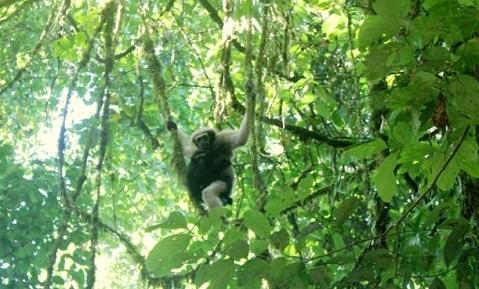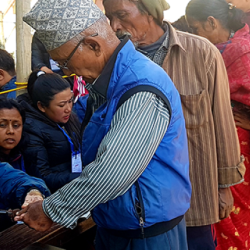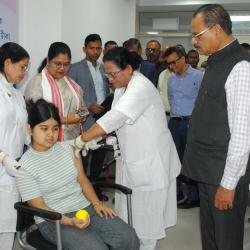Continuing efforts of conserving the last of India’s apes, the International Fund for Animal Welfare-Wildlife Trust of India (IFAW-WTI) team in collaboration with the Arunachal Pradesh State Forest Department successfully captured and released two eastern hoolock gibbons, over a two-day period, from the village of Dello to a safer and more suitable habitat in the Mehao WIldlife Sanctuary.
Ipra Mekola, Arunachal Pradesh State Wildlife Advisory Member, who was part of the release team yesterday, remarked on the project’s efforts saying “Gibbons essentially live in strong familial units. Capturing every family is extremely difficult to begin with and the more complex the terrain, the more laborious and cautious the operation becomes. Every single capture and release carried out by the IFAW-WTI team has been meticulously planned ensuring as little stress to the gibbons as possible.”
This was the fourth leg of the Mehao Gibbon Translocation Project making it the sixth family to be shifted. The last move had been carried out almost a year ago in December 2012 where a family of three hoolock gibbons had been moved from the village. The translocations by IFAW-WTI, through the years,have been supported by the Noyen-Melendez Family Trust, Serenity Trust, and philanthropists Himraj Dang, Subhadra and Kannan Jayaraman.
Primatologist Dr Kuladeep Roy, who is leading the project, commented on the urgency of the project saying, “The habitat for these gibbons in this area has degraded to a large extent. The gibbons are completely arboreal in nature and require a lot of trees for sustenance, mobility and survival. Now there are only isolated clusters of trees remaining in the area, if any at all. This restricts gibbon movement often forcing them to descend from the high tree tops to the ground where they can’t move with ease and instances of conflict and predation arise."
Hoolock gibbons are the only apes found in India, with their distribution restricted to the country’s northeast region. Two species have been identified here – eastern hoolock gibbon (Hoolock leuconedys) and western hoolock gibbons (Hoolock hoolock). They are protected under Schedule I of the Indian Wild Life (Protection) Act, 1972.
Sunil Kyarong, the Regional Head of Arunachal Pradesh for WTI, said, "What made yesterday's release different from the earlier ones was that for the first time we had a member of the local Idu Mishmi clan, present during the release. Generally the tribe considers gibbons to be a taboo and her presence is symbolic of the gradual change in perception of the locals."
Several awareness programmes are also being held all year round in Dello by the conservation team to sensitise the locals towards the plight of the gibbons in a bid to reduce conflict and to encourage afforestation and salvage the remaining habitat for these apes.
Simili Mithi, the Idu Mishmi member who was present during the release, remarked, "These apes are a part of our natural heritage and it's sad that their habitat is now threatened so much. I firmly believe in the cause of their conservation and am very happy with the effort being put in by IFAW-WTI in Dello. I'm glad that I was able to witness the translocation yesterday."
“Earlier in 2013, one of the female gibbons we had translocated gave birth in the wild which was a huge milestone since this is a major indicator of a successful rehabilitation. It meant that the gibbons are feeling completely at home in the release site,” added a gratified Kyarong.
- 7296 reads










Add new comment